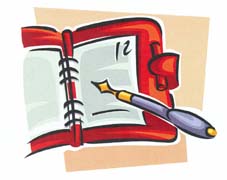If you don't know where you are going, you'll end up someplace else. ~ Yogi Berra
Many years ago, I asked my high school students to read
The 7 Habits of Highly Effective Teens by Sean Covey. It is much more approachable and entertaining than Steve Covey's business version, but based on the same seven habits. I have to admit that I learned a lot by reading and discussing the book with my students. If you don't know what the habits are, I'll list them here:
Habit 1: Be Proactive
Habit 2: Begin with the End in Mind
Habit 3: Put First Things First
Habit 4: Think Win-Win
Habit 5: Seek First to Understand, Then to be Understood
Habit 6: Synergize
Habit 7: Sharpen the Saw
Creating and using a yearly writing project chart supports habits 1,2,3 and 7. As Yogi Berra said, "If you don't know where you are going, you'll end up someplace else." In academia there is a lot of writing that needs to be done on specific deadlines - desirable faculty positions, prestigious journal publications and oodles of money can be lost because of lack of planning and time management. As a graduate student, the demands tend to be more immediate - weekly thought papers or reflections, semester final papers, and TA/RA related paperwork. However, if graduate students don't get in the habit of looking at long range plans and deadlines, they will also miss opportunities. In addition, to create
SMART goals that work, the graduate writer needs to recognize the big picture of their goals and projects and design backwards - especially when writing projects have multiple, dependent steps like writing a proposal, getting IRB, collecting data, analyzing, and finally writing!
Creating a yearly writing goals chart had been the topic of several study groups I've attended at professional conferences. The purpose of having a yearly writing goal chart is to:
1) Have all major deadlines and projects/ideas in one place (to help coordinate with personal events)
2) Have the calender in a visible place as a reminder for projects
3) Plan backwards for all the steps in each project
What should be on the yearly chart? I've created one for myself that has a list of deadlines and I use sticky-notes to move each project through the steps of publication - but I adjusted this from the one that another professor showed me. I include: Ideas; Data Collection/Abstract/Outline; Draft/Analysis; Present/Revise; Submit; Revision 1; Revision 2; and Publish. You can see my early spring chart in the picture. The pink stickies are for papers and the yellow stickies are for presentations. This whiteboard is on the wall by the door in my office - I am reminded of my projects every time I leave the room. Yours doesn't need to look like this - what is most important is to find a method that works best for you.
I know that writers of all sorts use multiple ways of planning their projects, like the ones below:
Blogs
Organize Your Blog Posts
How To Set Realistic Writing Goals For 2012
Blogging Tip: Create a Blog Calendar--Literally!
Writing and Running
Don’t Break the Chain - Jerry Seinfeld's Method for Creative Success
Writer's Calendar
Writing Romance: Laying out a Writing Calendar
Keeping a Writing Calendar



